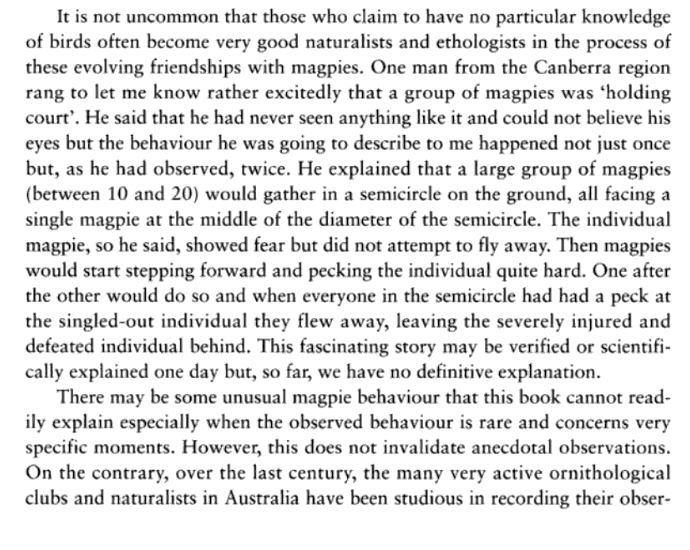I also bought and read her book some years ago as there didn’t seem to be any other definitive books on magpies available.
Based on my own observations I found her book interesting and filling in some gaps in my knowledge however, I did find that, while not a comment on the author but rather perhaps genuine lack of information, that
there were many comments around ‘not known’.
I feel my observations could perhaps fill some of these gaps but reinforced my desire to be able to tag and track individual birds, especially those forced out by territories wars. Where do these birds go? Do
they survive and find new territory? Where do the chicks go and how far, etc?
From: Suzanne EDGAR [
Sent: Tuesday, 20 August 2019 11:50 AM
To: 'Graeme Clifton';
Subject: RE: [canberrabirds] Magpie behaviour
I found her first bk on magpies, Australian Magpie, Biology & Behaviour of an Unusual Songbird UNSW Press 2004 excellent; my view based on long & intimate ob servation of several groups or magpies centred on
our block & adjacent Mormon Church block , Garran
Sz
From: Graeme Clifton
Sent: Monday, 19 August 2019 8:03 PM
To:
Subject: Fwd: [canberrabirds] Magpie behaviour
I refer to P Veerman email below.
I have never met Gisela Kaplan and do not know her. I am aware that she is an Emeritus Professor at UNE and has published widely.
Given P Veerman’s comments, I think that, in the interests of fairness, the moderator of this chatline should contact Gisela Kaplan and advise her of the content of P Veerman’s email. She should be offered the right of reply on this chatline.
Any other remedial options will be a matter for her to consider.
Graeme Clifton
I have read that passage before, though I can’t recall when. I suggest that her writing is liberally sprinkled with the weird overstatement. She gave a talk to
COG a few years ago and this supported my impression of her analysis. I would not recommend or bother to buy her books. Maybe a few months ago there was a mention of her on this line as a “legendary ornithologist”……. Which I had a public giggle at. However
when I consider the story, I suspect it is not all that noteworthy. Magpies have regular territorial skirmishes. These are usually in flight but sometimes it gets forced to the ground and this sort of thing happens. Then they may have a situation of one bird
being attacked or beaten up by several magpies. I think it is most typical when parents are telling their young to leave and take care of themselves. The only thing unusual in this story is the number of birds involved and that they formed part of a circle.
As such it is just a quantitative difference and not such a big deal.
Philip
From: Geoffrey Dabb
Sent: Sunday, 18 August, 2019 11:26 AM
To:
Subject: [canberrabirds] Magpie behaviour
I am looking for some background to the below passage in the introduction to Gisela Kaplan’s book on Magpies, 1st ed. It also appears in modified form in the 2nd ed, Chapter 9. It is given as
an example of an ‘apparent “rational” deliberate act in an animal’. The extract is snipped from Google books online. I am wondering if the original report was from a chatline subscriber.


